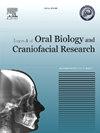利用深海海洋细菌菌株调节唾液微生物组:一项初步研究
Q1 Medicine
Journal of oral biology and craniofacial research
Pub Date : 2025-08-06
DOI:10.1016/j.jobcr.2025.07.024
引用次数: 0
摘要
口腔微生物组是局部和全身健康的关键决定因素。生态失调,特别是致病类群的过度生长,与各种口腔疾病有关,并可能导致口外炎症。虽然来自肠道共生菌的益生菌已经显示出一定的功效,但它们在口腔中的应用受到环境不兼容性的限制。海洋细菌,特别是那些适应极端环境的海洋细菌,由于其固有的抗菌和生物膜破坏特性,提供了一种新的治疗途径。目的探讨深海海洋细菌-碳酸分解海洋杆菌和假互生单胞菌-通过抑制口腔病原菌和丰富有益共生菌来调节唾液微生物群的潜力。方法采用随机、对照、双臂平行设计,纳入健康成人20例。受试者被分为治疗组(n = 10)和对照组(n = 10),治疗组使用海洋细菌漱口水7天,对照组不进行干预。在基线和干预后收集未受刺激的唾液样本。采用16S rRNA基因测序和物种特异性定量PCR进行微生物谱分析。分析包括配对t检验、主成分分析(PCA)和微生物网络推断,以评估微生物丰度和群落结构的变化。结果治疗组的变形链球菌和牙龈卟啉单胞菌数量有统计学意义的降低(p <;两者均为0.001),同时血链球菌和细孔菌也增加(p <;0.001)。PCA揭示了治疗后微生物组成的明显变化,在对照组中没有观察到聚类模式。共现网络分析表明微生物相互作用的重组,暗示着向更稳定和健康相关的微生物组的转变。结论海洋来源菌株的应用对口腔微生物群有良好的调节作用,包括抑制关键病原体和增强有益类群。虽然是初步的,但这些发现强调了海洋益生菌作为一种生物选择性和生态支持性口腔健康方法的治疗前景。需要更大规模的安慰剂对照研究来确认疗效、评估长期效果和评估临床结果。本文章由计算机程序翻译,如有差异,请以英文原文为准。
Modulation of the salivary microbiome using deep-sea marine bacterial strains: A pilot study
Background
The oral microbiome is a critical determinant of both local and systemic health. Dysbiosis, particularly the overgrowth of pathogenic taxa, is implicated in various oral diseases and may contribute to extraoral inflammatory conditions. Although probiotics derived from gut commensals have shown some efficacy, their application to the oral cavity is limited by environmental incompatibility. Marine bacteria, especially those adapted to extreme environments, offer a novel therapeutic avenue due to their inherent antimicrobial and biofilm-disruptive properties.
Aim
This pilot study investigated the potential of deep-sea marine bacterial strains—Marinobacter hydrocarbonoclasticus and Pseudoalteromonas spp.—to modulate the salivary microbiome by suppressing oral pathogens and enriching beneficial commensal species.
Methods
A randomized, controlled, two-arm parallel design was employed involving 20 healthy adult participants. Subjects were assigned either to a Treatment Group (n = 10), receiving a marine-derived bacterial mouthwash for seven days, or a Control Group (n = 10) with no intervention. Unstimulated saliva samples were collected at baseline and post-intervention. Microbial profiling was conducted using 16S rRNA gene sequencing and species-specific quantitative PCR. Analyses included paired t-tests, Principal Component Analysis (PCA), and microbial network inference to assess changes in microbial abundance and community structure.
Results
The Treatment Group demonstrated statistically significant reductions in Streptococcus mutans and Porphyromonas gingivalis (p < 0.001 for both), alongside increases in Streptococcus sanguinis and Veillonella spp. (p < 0.001). PCA revealed a distinct shift in microbial composition post-treatment, with clustering patterns not observed in the Control Group. Co-occurrence network analysis indicated a restructuring of microbial interactions, suggestive of a shift toward a more stable and health-associated microbiome.
Conclusion
The application of marine-derived bacterial strains was associated with favorable modulation of the oral microbiome, including suppression of key pathogens and enhancement of beneficial taxa. While preliminary, these findings highlight the therapeutic promise of marine probiotics as a biologically selective and ecologically supportive approach to oral health. Larger, placebo-controlled studies are warranted to confirm efficacy, assess long-term effects, and evaluate clinical outcomes.
求助全文
通过发布文献求助,成功后即可免费获取论文全文。
去求助
来源期刊

Journal of oral biology and craniofacial research
Medicine-Otorhinolaryngology
CiteScore
4.90
自引率
0.00%
发文量
133
审稿时长
167 days
期刊介绍:
Journal of Oral Biology and Craniofacial Research (JOBCR)is the official journal of the Craniofacial Research Foundation (CRF). The journal aims to provide a common platform for both clinical and translational research and to promote interdisciplinary sciences in craniofacial region. JOBCR publishes content that includes diseases, injuries and defects in the head, neck, face, jaws and the hard and soft tissues of the mouth and jaws and face region; diagnosis and medical management of diseases specific to the orofacial tissues and of oral manifestations of systemic diseases; studies on identifying populations at risk of oral disease or in need of specific care, and comparing regional, environmental, social, and access similarities and differences in dental care between populations; diseases of the mouth and related structures like salivary glands, temporomandibular joints, facial muscles and perioral skin; biomedical engineering, tissue engineering and stem cells. The journal publishes reviews, commentaries, peer-reviewed original research articles, short communication, and case reports.
 求助内容:
求助内容: 应助结果提醒方式:
应助结果提醒方式:


